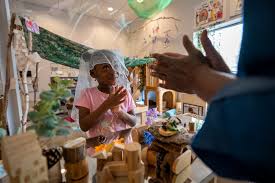
The Wonders of Babies
The Wonders of Babies
Babies, with their innocence and pure hearts, have the remarkable ability to bring joy and warmth into our lives. From their adorable smiles to their contagious laughter, babies have a way of capturing our hearts and reminding us of the beauty of life.
One of the most fascinating aspects of babies is their rapid development. In just a few short months, they go from being helpless newborns to curious explorers, constantly learning and absorbing information from the world around them. Every milestone they reach, from their first smile to their first steps, is a cause for celebration and wonder.
Another incredible thing about babies is their resilience. Despite facing challenges and obstacles as they grow, babies demonstrate remarkable strength and determination in overcoming them. Their ability to adapt and learn from every experience teaches us valuable lessons about perseverance and resilience.
Furthermore, the unconditional love that babies offer is unparalleled. Their innocent gaze and loving touch have the power to melt even the toughest hearts. The bond between a parent and child is one of the strongest connections in the world, built on trust, love, and mutual understanding.
In conclusion, babies are truly a gift to humanity. Their presence reminds us of the simple joys in life and teaches us important lessons about love, growth, and resilience. Let us cherish every moment with these little miracles and appreciate the wonders they bring into our lives.
8 Heartwarming Benefits of Having Babies in Our Lives
- Babies bring immense joy and happiness into our lives.
- They have the ability to create strong bonds within families.
- Babies teach us valuable lessons about love, patience, and selflessness.
- Their innocence and purity remind us of the beauty of life.
- Babies inspire us to see the world with wonder and curiosity.
- They encourage us to be more nurturing and caring individuals.
- Babies provide endless entertainment with their adorable antics and expressions.
- Watching babies grow and develop is a fascinating journey that brings fulfillment.
Five Challenges of Parenthood: Sleep Disruption, Overwhelming Care, Financial Strain, Restricted Freedom, and Career Impact
- Disruptive sleep patterns can lead to exhaustion for parents.
- Constant need for attention and care can be overwhelming.
- Financial strain due to expenses for baby supplies, healthcare, and childcare.
- Limited freedom and flexibility in daily routines due to baby’s demands.
- Potential impact on career advancement and personal time.
Babies bring immense joy and happiness into our lives.
Babies have a remarkable ability to bring immense joy and happiness into our lives. Their infectious laughter, innocent smiles, and pure presence can light up even the darkest of days. The unconditional love and warmth they exude create a sense of fulfillment and purpose that is truly unparalleled. Welcoming a baby into the world not only adds a new member to the family but also fills our hearts with overwhelming joy and gratitude for the precious moments shared with these little bundles of happiness.
They have the ability to create strong bonds within families.
Babies have the remarkable ability to create strong bonds within families. Their presence brings a sense of unity and love that transcends any differences or challenges. From the moment a baby is born, family members are drawn together in a shared sense of responsibility, joy, and devotion. The bond that forms between parents, siblings, and extended family members through caring for and nurturing a baby is incredibly powerful and enduring. Through their unconditional love and dependence, babies have the unique gift of strengthening familial connections and fostering a deep sense of belonging and togetherness within the family unit.
Babies teach us valuable lessons about love, patience, and selflessness.
Babies serve as powerful teachers, imparting invaluable lessons on love, patience, and selflessness. Through their unconditional affection and constant need for care, they show us the boundless capacity of love within our hearts. Their demands for attention and nurturing teach us the virtue of patience as we learn to tend to their needs with grace and understanding. Additionally, the selfless dedication required in caring for a baby instills in us a sense of responsibility and compassion, fostering a deeper connection to the world around us. In essence, babies are not only precious little beings but also profound guides on the path to becoming more loving, patient, and selfless individuals.
Their innocence and purity remind us of the beauty of life.
The innocence and purity of babies serve as a poignant reminder of the beauty of life. In their untainted view of the world, babies embody a sense of wonder and simplicity that can often get lost in the complexities of adulthood. Their genuine smiles, unfiltered emotions, and boundless curiosity encourage us to see the world through fresh eyes and appreciate the small joys that surround us every day. Babies have a way of bringing lightness and warmth into our lives, reminding us to embrace each moment with gratitude and awe.
Babies inspire us to see the world with wonder and curiosity.
Babies have a unique ability to inspire us to see the world with wonder and curiosity. Their fresh perspective and unfiltered reactions to everyday experiences remind us of the beauty and magic that surrounds us. Through their innocent eyes, we are encouraged to view the world with a sense of awe and fascination, rekindling our own sense of wonder and reminding us to appreciate the simple joys in life.
They encourage us to be more nurturing and caring individuals.
Babies have a remarkable ability to encourage us to be more nurturing and caring individuals. Their innocence and vulnerability evoke a sense of responsibility and compassion within us, motivating us to provide love, care, and protection. By tending to the needs of a baby, we learn the value of empathy, patience, and selflessness. This nurturing relationship with babies not only fosters their growth and development but also helps us cultivate a deeper sense of connection and empathy towards others in our lives.
Babies provide endless entertainment with their adorable antics and expressions.
Babies provide endless entertainment with their adorable antics and expressions. From their contagious giggles to their curious exploration of the world around them, babies never fail to bring a smile to our faces. Whether they are babbling incoherently, making funny faces, or clumsily trying to crawl, every moment with a baby is filled with joy and laughter. Their innocence and pure hearts shine through in everything they do, making them a constant source of entertainment and delight for those around them.
Watching babies grow and develop is a fascinating journey that brings fulfillment.
Watching babies grow and develop is a captivating and rewarding experience that brings immense fulfillment. Witnessing their first smiles, babbling sounds, and wobbly first steps fills our hearts with joy and wonder. Each milestone achieved by babies represents a small victory in their journey of growth and discovery, reminding us of the beauty and simplicity of life. The progress they make, both physically and emotionally, serves as a constant source of inspiration and motivation, highlighting the incredible potential for growth and learning that exists within each child.
Disruptive sleep patterns can lead to exhaustion for parents.
Disruptive sleep patterns in babies can be a significant challenge for parents, often leading to exhaustion and fatigue. The constant waking during the night, frequent feedings, and unpredictable sleep cycles can disrupt the parents’ ability to get adequate rest, impacting their physical and mental well-being. This exhaustion can affect their daily functioning, mood, and overall quality of life. Finding strategies to cope with these disrupted sleep patterns is crucial for parents to maintain their health and well-being while caring for their little ones.
Constant need for attention and care can be overwhelming.
The constant need for attention and care that babies require can be overwhelming for parents and caregivers. From feeding and changing diapers to soothing cries and ensuring safety, the demands of caring for a baby can be all-encompassing. The never-ending cycle of meeting their needs can leave individuals feeling exhausted, stressed, and in need of support. Finding a balance between attending to a baby’s needs and taking care of oneself is essential to prevent burnout and maintain overall well-being.
Financial strain due to expenses for baby supplies, healthcare, and childcare.
One significant challenge that many parents face when welcoming a new baby into their lives is the financial strain that comes with the expenses for baby supplies, healthcare, and childcare. From diapers and formula to medical check-ups and daycare costs, the financial responsibilities can quickly add up and put a strain on the family budget. Balancing these expenses while ensuring the well-being and proper care of the baby can be a daunting task for many families, requiring careful planning and budgeting to navigate through this con of raising a child.
Limited freedom and flexibility in daily routines due to baby’s demands.
One common challenge that comes with caring for a baby is the limited freedom and flexibility in daily routines. Babies have their own set of demands and needs that often dictate the schedule of their caregivers. From feeding times to nap schedules, parents and caregivers must constantly adjust their daily routines to accommodate the needs of their little ones. This lack of flexibility can sometimes feel restrictive, making it difficult to plan activities or outings without considering the baby’s needs first. Despite these challenges, many parents find joy and fulfillment in prioritizing their baby’s well-being and adapting to a new sense of routine centered around their child.
Potential impact on career advancement and personal time.
Babies have the potential to significantly impact career advancement and personal time for parents. Balancing the demands of a career with the responsibilities of caring for a baby can be challenging, often requiring sacrifices in terms of time and energy. Many parents find themselves navigating the delicate balance between work commitments and the needs of their child, which can sometimes hinder opportunities for career growth and advancement. Additionally, the round-the-clock care that babies require can limit personal time for self-care, hobbies, and social activities, leading to potential feelings of exhaustion and burnout among parents. It’s important for parents to seek support systems and resources to help manage these challenges effectively while still prioritizing their own well-being.


